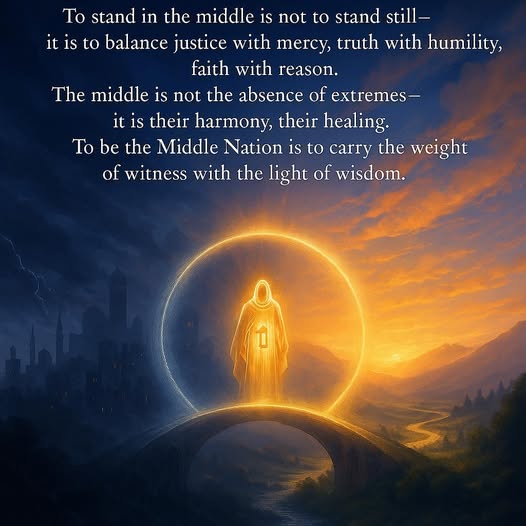
(The Role of the Final Nation and the Continuity of Prophetic Religion)
Islam was never meant to be a “new religion.” It is the continuation and culmination of a divine mission that began with Adam and was carried forward by a chain of prophets—Noah, Abraham, Moses, Jesus, and finally, Muhammad (peace be upon them all). The Qur’an is not a disruption, but a restoration—and Prophet Muhammad (pbuh) did not bring a new faith but purified and completed the one already sent.
This understanding is essential to grasp the Qur’an’s designation of the Muslim community as a “Middle Nation”—both in position and in principle.
“And thus We have made you a middle nation, so that you may be witnesses over mankind, and the Messenger may be a witness over you.”
(Qur’an 2:143)
This is not a mere geographic description, nor simply a metaphor for moderation. It is a multi-layered identity that reflects both a strategic positioning in the unfolding of history and a principled approach to truth, justice, and invitation.
This verse is foundational. It places Muslims at the center of the divine project for humanity—not in terms of superiority, but in responsibility. The “middle” (wasat) here holds three essential meanings:
1. Middle in Geography and History
At the time of this verse’s revelation, the Muslim community was geographically and civilizationally at a crossroads:
-Between the East and West.
-Between empires—Rome and Persia.
-Between earlier prophetic histories—Israelite and Arab.
Mecca and Medina were situated at the center of trade, culture, and revelation, linking the Abrahamic traditions with a new global vision. This central position was not accidental—it allowed Islam to act as a bridge, inheriting the truths of the past and transmitting them forward.
2. Middle in Principle: Balance Between Extremes
The “middle” also signifies a balance between excess and deficiency, a defining characteristic of the Muslim worldview:
– Between spiritual asceticism and worldly indulgence.
– Between blind ritualism and lawless rebellion.
– Between racial exclusivity and lawless universalism.
Islam offers a balanced path—neither abandoning the world nor idolizing it. It demands justice, but tempers it with mercy. It acknowledges divine destiny but commands moral responsibility.
Where past nations faltered—some transforming religion into a form of racial entitlement, others reducing it to hollow ritual or spectacle—the Muslim community is entrusted with upholding a faith rooted in clarity, justice, and peace. However, the rise of extremism among some Muslims has contributed to growing Islamophobia, just as the surge in antisemitism today is closely linked to the actions of the government of Israel in Gaza. These are not reflections of true faith but dangerous deviations that must not be overlooked.
3. Middle in Mission: Witness Over All Nations
The verse continues:
“…so that you may be witnesses over mankind…”
This establishes the primary role of the Muslim community (Ummah): to testify to the truth of God’s message before humanity, just as previous communities were once tasked to do. It is a moral guardianship over human conscience.
This witnessing is not coercive, but invitational—through:
-Words of truth,
-Actions rooted in justice,
-And institutions built on ethical foundations.
The mission of Muslims is not to dominate but to demonstrate—to reflect the light of divine guidance so others may see.
The Quran in verse 2:62, emphasizes that belief in one God , the Last Day, and righteous conduct are the keys to reward from God, regardless of religious label—if those conditions are met.
In Today’s Context
In our times, the call to fulfill this middle role is more urgent than ever:
-The world is polarized—between secular materialism and religious extremism.
-Truth is fragmented—and religion is often misused for politics, exclusion, or violence.
– Many feel spiritually homeless—adrift between old dogmas and new deceptions.
In this context, the “Middle Nation” must rise—not with swords or slogans, but with clarity, wisdom, and mercy. The Prophet Mohammad was a mercy to the worlds—not a tribal leader or ideological warrior.
“Invite to the way of your Lord with wisdom and good preaching, and argue with them in the best manner.”
(Qur’an 16:125)
Conclusion:
To be the “Middle Nation” is a sacred trust—a call to embody divine equilibrium in all aspects of life. It is not passivity, but proactive justice; not compromise, but principled balance.
Muslims today must reclaim this legacy by:
-Rejecting all forms of extremism,
-Championing universal justice,
-Serving as humble witnesses to truth through exemplary conduct.
This is the eternal challenge—and honor—of being Middle Nation (Ummatan Wasatan). Let this be the reminder: Our position is not a privilege—it is a pledge. Let Muslims rise—not with the arrogance of power, but the serenity of balance. In a world of extremes, let us be the middle—not passive, but principled.

